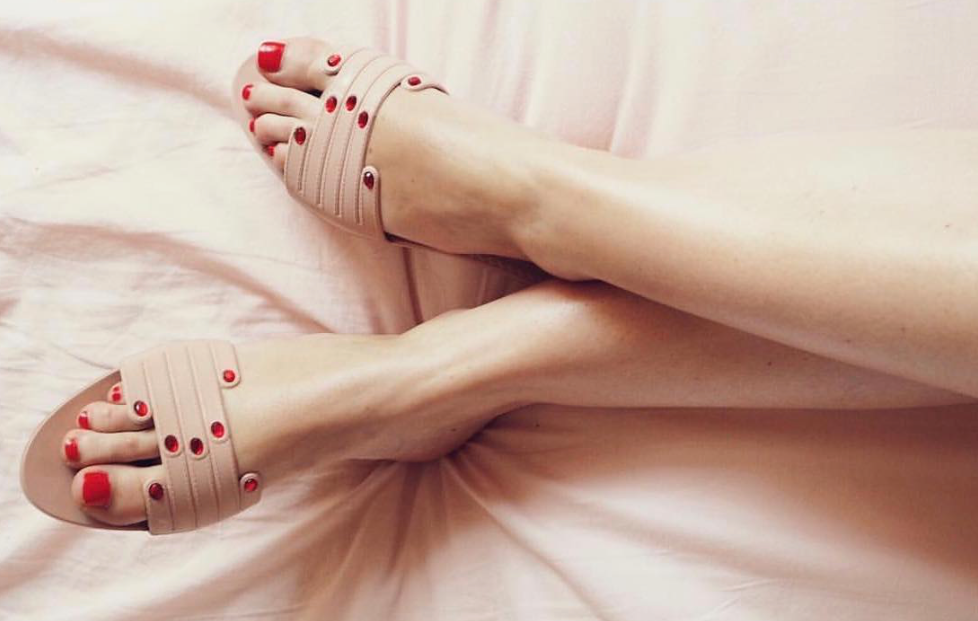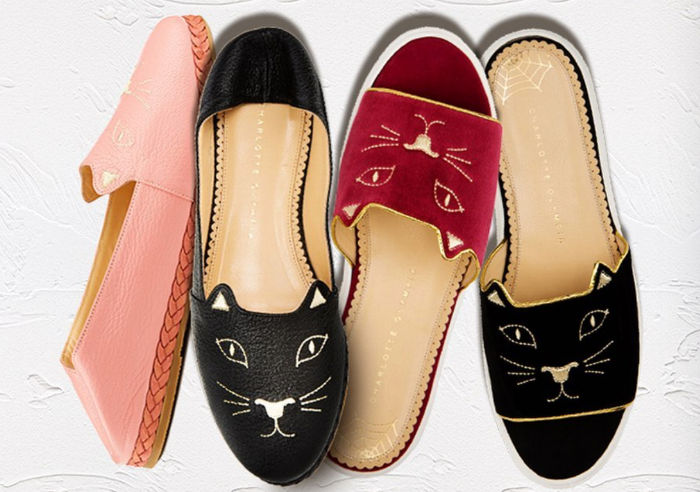
image: Charlotte Olympia
Can you own a name? GMA Accessories, Inc. is claiming to own the trademark “Charlotte” and has filed suit against London-based accessories brand Charlotte Olympia and an array of its biggest stockists, alleging that the London-based footwear brand is “knowingly and intentionally” infringing its trademark. New York-based GMA, which, until recently held federal trademark registrations for the word “Charlotte” for use on clothing, footwear, and jewelry, has escalated a four-year long battle over the right to the name, and has named Nordstrom, Bergdorf Goodman, Macy’s and Hudson’s Bay in its lawsuit for trademark infringement and false designation of origin.
Additionally, according to GMA’s complaint, which was filed last week in the U.S. District Court for the Southern District of New York, it is also seeking to appeal the U.S. Patent and Trademark Office (“USPTO”)’s Trademark Trial and Appeals Board (“TTAB”)’s decision to invalidate its trademarks.
A Bit of Background
Over the past four years, in addition to collaborating with Agent Provocateur, Havaianas, Matel (for a Barbie collection), and Marvel (for Spider Man-themed accessories), and opening a handful of new brick-and-mortar stores in in Bangkok, Las Vegas, London and Southern California, Charlotte Olympia has been fighting a battle against GMA, which has been attempting to prevent it from registering its CHARLOTTE OLYMPIA trademark.
This battle got its roots in 2011 when Charlotte Olympia filed an application with the USPTO to register the CHARLOTTE OLYMPIA trademark for use on various types of goods, including jewelry and footwear. However, before a mark may be registered with the USPTO, it must be published for opposition, giving any party who believes it may be damaged by registration of the mark a chance to oppose it.
In June 2013, GMA did just that: It filed an opposition to the Charlotte Olympia’s application, alleging that the CHARLOTTE OLYMPIA mark is confusingly similar to its own then-registered trademarks for “Charlotte” for use on clothing, jewelry, and footwear, among other things. (Opposition No. 91211164).

In response to GMA’s opposition, Charlotte Olympia’s counsel – the trademark team at New York-based Pryor Cashman – filed a counterclaim, seeking to cancel two of GMA’s “Charlotte” trademarks, arguing that by not using the marks for “at least three consecutive years with the intent not to resume such use,” it had abandoned the marks. (Note: In order to maintain trademark rights in the U.S., you have to actually use the marks on all of the types of goods/services listed on your trademark registration).
Charlotte Olympia’s counsel noted in its trial brief that instead of actually using the “Charlotte” trademark on goods, such as clothing, footwear, and jewelry, GMA has taken to suing others for using marks that include the word “Charlotte.” Over the past several years alone, GMA has initiated trademark opposition proceedings against a handful of companies, including designer Charlotte Ronson and well-known makeup artist Charlotte Tilbury in the relatively recent past, among others.
According to Charlotte Olympia’s brief, “As shown by GMA’s own evidence, it appears that GMA is not in the business of selling hats, scarves, gloves and socks but rather in the business of shaking down perceived deep pockets.”
In saying so, Charlotte Olympia’s counsel is seemingly suggesting that GMA operates more like a troll – an entity that does not actually use its trademarks but instead, tries to make money off of them by threatening to sue (i.e. demanding a license fee from) anyone who could arguably be said to be using them without permission (or “infringing them”) – than a brand known for selling clothing, jewelry and/or footwear under the “Charlotte” trademark.
The brief further noted that Charlotte Olympia, “on principle, does not succumb to ransom demands and has therefore endured three years of delay and harassment in order to obtain registration for its CHARLOTTE OLYMPIA mark in Class 25 [the trademark class that covers footwear], the major class that in which it operates.”
In June 2017, the TTAB ruled in Charlotte Olympia’s favor, stating that Charlotte Olympia had “established, at a minimum, that a prima facie case of abandonment exists with respect to both of [GMA Accessories’ trademark] registrations [for CHARLOTTE].” Specifically, the TTAB found that GMA’s failure to produce evidence of any product samples, marketing or advertising plans, promotional materials or correspondence with any consulting or PR firms showing its use of the CHARLOTTE marks in the U.S. between 2011 and 2015 “is particularly telling.”
The TTAB also stated that GMA “should have been able to produce such documents” and that its failure to do so “is highly probative with respect to making a factual finding [GMA] was not using its mark on the goods identified in the registrations for the years 2011-2015.”
As such, the TTAB granted Charlotte Olympia’s counterclaim, cancelling GMA’s two CHARLOTTE marks. Additionally, it also did away with GMA’s opposition against Charlotte Olympia’s pending trademark registration, since, without its “Charlotte” trademarks in the classes that cover footwear and jewelry, GMA lacks a basis to claim confusion with Charlotte Olympia’s application.
GMA v. Charlotte Olympia
Skip forward to last week and GMA – unsatisfied with the TTAB’s finding – filed suit, alleging that it “has been selling jewelry under the brand name CHARLOTTE since at least as early as 2006. In approximately 2012, [Charlotte] Olympia began using the CHARLOTTE mark to identify a line of shoes and handbags and thereafter certain items of jewelry that it named CHARLOTTE OLYMPIA without permission from GMA.”
GMA continues on to allege in its complaint that “instead of requesting permission to use the CHARLOTTE mark or selecting a different mark, [Charlotte Olympia] decided to infringe, and/or turned a blind eye to the rights of [GMA].” As a result, Charlotte Olympia is allegedly causing confusion amongst both “retail store buyers and consumers,” thereby giving rise to trademark infringement.
And in case that is not enough, GMA further claims that Charlotte Olympia has “taken advantage of the creativity of GMA in coining the CHARLOTTE mark, of the good will developed by GMA in the mark CHARLOTTE.” And because Charlotte Olympia is the more well-known of the two brands, GMA claims Charlotte Olympia is “creating reverse confusion so that the public and retail buyers believe or will come to believe that [Charlotte Olympia] is actually the owner of the CHARLOTTE brand handbags.”
With the foregoing in mind, GMA believes it is entitled to “recover [Charlotte Olympia’s] profits arising from its acts of trademark infringement and false designation of origin,” and to injunctive relief, which would immediately and permanently bar Charlotte Olympia from using the word “Charlotte” in any products and marketing materials.
* The case is GMA Accessories, Inc. v. Charlotte Olympia Holdings Limited, et al, 1:17-cv-06049 (SDNY).







